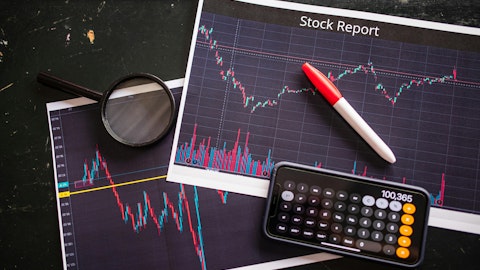In this article, we will look at 12 Cheap Retail Stocks to Buy According to Hedge Funds.
Will Trump’s Tariffs Impact Retail Stocks?
The Trump administration proposed 25% tariffs on goods imported from Canada and Mexico and 10% tariffs on Chinese-imported goods. Analysts believe these tariffs will affect retail stocks and the goods manufactured in the tariffed countries, at least theoretically. While tariffs on Mexico and Canada have been delayed, they have kicked in for China, according to Yahoo! Finance. This has led to several retailers moving sourcing out of China to contain costs.
Simeon Siegel, retail analyst at BMO Capital Markets, appeared in an episode of Yahoo! Finance’s Opening Bid podcast. Talking about the potential effect of Trump’s tariffs on retail stocks, he was of the opinion that we are focusing on tariffs more than is required. Taking a purely business perspective, he reasoned that a tariff is nothing more than a cost input going up, quite like how the cost of cotton, shipping, or labor can rise.
When such cases materialize, companies take steps to deal with the rising costs, but they don’t become all-encompassed by them. Siegel posited that the uncertainty surrounding this scenario is dramatically more concerning than the actual severity. Approaching the situation as an analyst, he said that he is focusing on companies with the pricing power and capability to deal with rising costs, regardless of why the costs are increasing. Healthy brands with healthy businesses are thus the way to approach this conversation.
Big Tech’s Massive CapEx Plans: Will They Affect Retailers?
Big Tech’s massive capex plans dictate the potential spending of a cumulative $325 billion in capital expenditures and investments in 2025, primarily due to a strong commitment to building AI infrastructure. While it does not seem evident, Morgan Stanley is of the opinion that retail stocks might be the overlooked winners of these significant AI investment plans. AI “hyperscalers” are invested in a spending race, which might prove to be a tailwind hidden in plain sight for the retail sector, which is already evolving due to the technological leap surrounding AI, automation, and data.
Equity analyst Simeon Gutman said that while retailers may not be as invested in pursuing AI infrastructure investments as tech companies, “the tech capex boom suggests retailers are on the verge of and should benefit from a technology inflection.” The announced $325 billion may not be an initiative taken to directly impact the retail sector, but Morgan Stanley predicts that it may result in a capex boost amidst retailers in a position to afford it. The boom may present big-box retailers with significant investing opportunities to improve and augment automation, in-store experiences, and advertising. Consequently, market share gains may materialize for retailers in the best position to invest.
With these trends in mind, let’s examine the top 12 cheap retail stocks to buy according to hedge funds.

A stylish young woman modeling a dress from the retailer showcasing its cutting-edge fashion.
Our Methodology
We sifted through stock screeners, online rankings, and ETFs to compile a list of 30 retail stocks. We checked their forward P/E ratios (less than 15) and then selected the top 12 most popular stocks among elite hedge funds as of Q3 2024. We sourced the hedge fund sentiment data from Insider Monkey’s database. The list is sorted in ascending order of hedge fund sentiment. Please note that the forward P/E ratios are as of February 11, 2025.
Why do we care about what hedge funds do? The reason is simple: our research has shown that we can outperform the market by imitating the top stock picks of the best hedge funds. Our quarterly newsletter’s strategy selects 14 small-cap and large-cap stocks every quarter and has returned 275% since May 2014, beating its benchmark by 150 percentage points (see more details here).
12 Cheap Retail Stocks to Buy According to Hedge Funds
12. Nordstrom, Inc. (NYSE:JWN)
Forward P/E: 12.22
Number of Hedge Fund Holders: 32
Nordstrom, Inc. (NYSE:JWN) offers luxury, private-label merchandise for women, men, and children, primarily focusing on apparel, beauty, shoes, accessories, home goods, and more. The company delivered 4% comparable sales growth in fiscal Q3 2024 through Nordstrom and Nordstrom, which supported it in surpassing $3.3 billion in net sales for the quarter.
Its online business is another prominent growth driver for the company, undergoing more than 6% digital sales growth in the quarter. Much of this growth was attributed to the newness Nordstrom, Inc. (NYSE:JWN) has introduced in its brands. Customers are increasingly relating to the company’s offerings, which is driving positive company net sales growth for the fourth consecutive quarter.
Nordstrom, Inc. (NYSE:JWN) has plans to continue this positive momentum through several primary priorities, including operational optimization, Nordstrom banner growth, and continued momentum growth at Nordstrom Rack. Nordstrom, Inc. (NYSE:JWN) has also made substantial progress in its supply chain to support growth, reducing operating expenses and expanding its focus to increasing speed. It is prioritizing quick order deliveries to its customers and is moving products efficiently through its network to provide freshness and relevance. These strategies are proving successful, as the company’s initiatives for faster delivery of items and fulfillment drove an improvement of more than 40% in the speed of customer returns in fiscal Q3 2024.
11. Walgreens Boots Alliance, Inc. (NASDAQ:WBA)
Forward P/E: 6.2
Number of Hedge Fund Holders: 33
Walgreens Boots Alliance, Inc. (NASDAQ:WBA) is an American multinational company providing retail, pharmacy, and healthcare services. The company has approximately 12,500 locations across the US, Europe, and Latin America. Its brand portfolio includes well-known brands like Walgreens, Boots, Duane Reade, o7 Beauty Company, and Benavides.
The company is reevaluating its merchandising strategy to identify with its consumers more closely. It plans to expand its brand offerings while being selective with national brands, particularly in health and wellness categories. In fiscal 2024, it launched more than 300 new owned brand products and plans to launch another 300 in fiscal 2025.
Walgreens Boots Alliance, Inc. (NASDAQ:WBA) is also implementing a strategic footprint optimization program to close approximately 1,200 underperforming stores over the next three years. The company has planned around 500 closures for fiscal 2025. Through this strategic move, Walgreens Boots Alliance, Inc. (NASDAQ:WBA) expects to improve its adjusted earnings per share (EPS) and free cash flow. Walgreens Boots Alliance, Inc. (NASDAQ:WBA) is also optimizing its retail presence and is focusing on strategic cost management initiatives. It ranks 11th on our list of the 12 cheap retail stocks to buy according to hedge funds.
10. Bath & Body Works, Inc. (NYSE:BBWI)
Forward P/E: 10.88
Number of Hedge Fund Holders: 36
Bath & Body Works, Inc. (NYSE:BBWI) is a specialty omnichannel retailer specializing in personal care and home fragrance. It sells its merchandise under Bath & Body Works, White Barn, and other brands. Bath & Body Works, Inc. (NYSE:BBWI) sells its merchandise in around 1,850 company-operated stores and e-commerce sites across the US and Canada. It also has around 485 stores and 28 e-commerce sites in over 40 other countries worldwide, operating under license, franchise, and wholesale arrangements.
The company is driving momentum toward long-term profitable growth by executing its five E strategy. The five Es of its strategy includes elevating the Bath and Body Works brand and core products, engaging with its core customers innovatively, extending its reach to new markets and adjacencies, enhancing its omnichannel experience, and enhancing operational efficiency and excellence. This strategy is proving profitable for the company, as Bath & Body Works, Inc. (NYSE:BBWI) reported a 3% growth in its net sales in fiscal Q3 2024, reflecting a positive growth in its core operations.
It also holds a competitive market edge due to its predominantly US-based supply chain and agile business model. The company ranks fifth on our list and has a forward P/E of 10.88 at a 35.67% discount to its sector. Its median price target of $35.45 implies an upside of 21.30% from current levels. On February 11, Dana Telsey from Telsey Advisory maintained a Buy rating on the company with a price target of $43.00.
9. Best Buy Co., Inc. (NYSE:BBY)
Forward P/E: 14.23
Number of Hedge Fund Holders: 37
Best Buy Co., Inc. (NYSE:BBY) is a retailer that deals in a range of consumer technology products and services. Its operations are divided into two business segments: Domestic and International.
Although the company reported lower-than-expected sales in fiscal Q3 2025 due to the ongoing macro uncertainty in the sector, it drove strong year-over-year gross margin rate expansion of 60 basis points. This growth was attributed to improvement in its membership and services offers. Best Buy Co., Inc. (NYSE:BBY) also boasts a strong balance sheet. It ended fiscal Q3 2025 with $643 million available in cash and cash equivalents, up from $636 million in the prior year period. The company’s operating cash flow also jumped to $561 million, from $290 million in the same quarter last year. This cash generation allowed the company to distribute $202 million worth of dividends during the quarter.
The company is focusing on diversifying its services, particularly through its Geek Squad, and expanding its health segment. These initiatives are expected to strengthen customer relationships and boost margins for the company. It is also focusing on supply chain management and effective inventory management to meet consumer needs. Best Buy Co., Inc. (NYSE:BBY) ranks ninth on our list of the 12 cheap retail stocks to buy now.
8. Macy’s, Inc. (NYSE:M)
Forward P/E: 5.98
Number of Hedge Fund Holders: 38
Macy’s Inc. (NYSE:M) is an omnichannel retail store that manages three brands: Macy’s, Bloomingdale’s, and Bluemercury. These brands sell a variety of merchandise, including accessories, apparel, consumer goods, home furnishings, and more. The company operates stores in 43 US states, The District of Columbia, Guam, and Puerto Rico.
The company is undertaking initiatives to make progress in its Bold New Chapter strategy, which is helping it stay on track to attain its long-term goals of sustainable growth. The company announced plans to close 150 stores underproductive for this strategy by 2026. It is expected to keep only 350 stores in its portfolio and continue implementing its Bold New Chapter strategy for them, which entails a shift to chasing wealthier shoppers with the company’s high-end brands, including Bluemercury and Bloomingdale’s.
Macy’s Inc. (NYSE:M) reported net sales of $4.7 billion in fiscal Q3 2024, which is in line with the outlook it provided. The company has a forward P/E ratio of 5.98 and is trading at a 64.63% discount to its sector. Its median price target of $14.67 implies an upside of 9.07% from current levels. On February 3, Benchmark Co. analyst Mark Zgutowicz reiterated a Buy rating on the stock and set a price target of $600.00.
7. The Gap Inc. (NYSE:GAP)
Forward P/E: 11.15
Number of Hedge Fund Holders: 39
The Gap, Inc. (NYSE:GAP) is a specialty retailer in the US that offers apparel, accessories, and personal care products for women, men, and children. Its brand portfolio includes Old Navy, Gap, Banana Republic, and Athleta brands. The company reported net sales of $3.8 billion in fiscal Q3 2024, reflecting a 2% year-over-year growth. Its gross margin expanded 140 basis points, delivering an operating income of $355 million and an operating margin of 9.3%, an increase of 270 basis points versus last year.
On January 27, The Gap, Inc. (NYSE:GAP) announced an expanded partnership with Sean Wotherspoon, its global vintage curator, to release GapVintage and bring the company’s iconic product archive directly to customers across the globe. The company will include seasonal and themed drops, taking control of its vintage products as the secondhand market continues to grow and resonate among younger generations.
The company has a forward P/E of 11.15, and is trading at a 34.11% discount to its sector. Its median price target of $22.32 implies an upside of 34.41% from current levels. The Gap, Inc. (NYSE:GAP) ranks seventh on our list.
6. The Kroger Co. (NYSE:KR)
Forward P/E: 14.67
Number of Hedge Fund Holders: 39
The Kroger Co. (NYSE:KR) is a food and drug retailer that operates supermarkets, fulfillment centers, and multi-department stores. Its brand portfolio includes Smart Way, Big K, Heritage Farm, Simple Truth Organic, and Simple Truth. The company operates approximately 2,722 supermarkets, 2,257 pharmacies, and 1,665 fuel centers in 35 US states and the District of Columbia.
The company has an established digital presence that it has attained by investing in automation, creating distribution channels in delivery and pickup, building out its own properties, and enhancing personalization over nearly a decade. The Kroger Co. (NYSE:KR) is benefiting from this presence, as its digital sales increased by 11% in the fiscal Q3 2024. Delivery sales were up by 18%, primarily driven by customer fulfillment centers. The fact that digital sales account for just 10% of total sales also underlines the massive opportunity for growth amid the digital revolution.
The Kroger Co. (NYSE:KR) has other plans to improve its standing as well. It is focusing on enhancing customer loyalty, expanding its digital footprint, and, engaging in competitive pricing to drive sales and strengthen profit margins. The company’s performance reflects that it can continue to be profitable under various market circumstances, ranking it sixth on our list of the 12 cheap retail stocks to buy according to hedge funds.
5. Dollar Tree, Inc. (NASDAQ:DLTR)
Forward P/E: 13.63
Number of Hedge Fund Holders: 40
Dollar Tree, Inc. (NASDAQ:DLTR) operates discount department stores and offers a wide range of merchandise under the brand names Dollar Tree and Dollar Tree Canada. Family Dollar stores offer home products, consumable merchandise, accessories and apparel, electronics, and seasonal merchandise.
The company reported a revenue of $7.56 billion in fiscal Q3 2024, exceeding the forecast of $7.446 billion. Its net sales also grew significantly, primarily due to its non-comparable stores. This growth was attributed to the company’s continued merchandising efforts for Family Dollar and Dollar Tree. Despite some macroeconomic challenges, Dollar Tree, Inc. (NASDAQ:DLTR) is maintaining strong operational results.
The company is focusing on boosting the growth of its Dollar Tree brand and is converting stores to its in-line multi-price 3.0 format. It is opening new stores and improving the in-store experience for its customers through customer service enhancements and renovations. In fiscal Q3 2024, the company converted another 720 stores to the 3.0 format, bringing the total number of converted Dollar Tree stores to around 2,300. These stores produced around 30% of the company’s total net sales in fiscal Q3 2024. The company has a forward P/E of 13.63 and is trading at a 14.94% discount to its sector.
4. Dollar General Corporation (NYSE:DG)
Forward P/E: 12.91
Number of Hedge Fund Holders: 45
Dollar General (NYSE:DG) is a retailer that offers an elaborate array of merchandise in its stores, including home products, consumables, seasonal items, apparel, and more. Its merchandise collection includes its own private brands and brands from manufacturers.
Through fiscal Q3 2024, the business generated cash flows of $2.2 billion from operations, an increase of 52% due to improvements in Dollar General’s (NYSE:DG) working capital position, mainly through inventory management. Its net sales grew by 5% to $10.2 billion in fiscal Q3 2024. The company raised its market share in both dollars and units in highly consumable and non-consumable product sales during the quarter. Its same-store sales also rose by 1.3%, attributed to 1.1% growth in the average transaction amount, including the average unit retail price per item and the increase in average items per basket.
The company’s primary priority is investing in its business, including its existing store base and organic growth opportunities, such as strategic initiatives and new store expansion. Dollar General (NYSE:DG) has strong growth projections and estimates a 7% increase in cash flow and 11% growth in earnings annually over the coming years.
3. Abercrombie & Fitch Co. (NYSE:ANF)
Forward P/E: 10.5
Number of Hedge Fund Holders: 51
Abercrombie & Fitch (NYSE:ANF) is a global omnichannel retailer that offers an assortment of apparel, accessories, and personal care products for men, women, and children. Its brands include Abercrombie & Fitch, Abercrombie Kids, and Hollister. Positive trends for Abercrombie & Fitch (NYSE:ANF) were reflected across all its working regions in fiscal Q3 2024. The Americas grew by 14% and delivered the sixth consecutive quarter of double-digital sales growth. APAC and EMEA grew by 32% and 15%, respectively.
The company delivered net sales of $1.2 billion in fiscal Q3 2024, up 14% from fiscal Q3 2023. This growth was attributed to the company’s strong playbook, which delivered value for existing and new customers. Its sales are growing primarily because more customers are responding to its experience and product voice.
Carillon Eagle Small Cap Growth Fund stated the following regarding Abercrombie & Fitch Co. (NYSE:ANF) in its Q3 2024 investor letter:
“Abercrombie & Fitch Co. (NYSE:ANF) is a global multi-brand omnichannel specialty retailer of apparel, personal care products, and accessories for men, women, and kids. The stock lagged during the period despite reporting strong quarterly results and lifting forward guidance. We believe the performance is more a result of elevated investor expectations than any weakening of the underlying fundamentals, which we believe continue to remain strong.”
2. Albertsons Companies, Inc. (NYSE:ACI)
Forward P/E: 9.19
Number of Hedge Fund Holders: 58
Albertsons Companies, Inc. (NYSE:ACI) is a US-based food and drug retailer. It has over 2,269 stores across 34 states and the District of Columbia under 20 banners, including Star Market, Shaw’s, Albertsons, Kings Food Markets, United Supermarkets, Haggen, Kings Food Markets, Acme, Carrs, and more.
The company’s fiscal Q3 2024 revenue reached $18.8 billion, up 1.2% year-over-year but below analyst estimates. Albertsons Companies, Inc. (NYSE:ACI) is thus focusing on key strategies to drive growth. It is investing in pharmacy and health, which has driven sales penetration to over 11% of total annual revenue. It is also investing in its e-commerce business, which it runs out of its stores so its inventory is close to its customers. Its ecommerce investments have driven sales penetration to over 7% of grocery revenue. This growth has been supported by new developments in the company’s mobile app and improved quality, speed, and convenience of DriveUp & Go and in-home delivery.
Albertsons Companies, Inc. (NYSE:ACI) plans to continue investing to deliver consistent omni-execution for brand campaigns across its digital and physical assets. It also expects to build new partnerships to add digital inventory and capabilities to its platform. The company ranks second on our list.
1. CVS Health Corporation (NYSE:CVS)
Forward P/E: 10.48
Number of Hedge Fund Holders: 63
CVS Health Corporation (NYSE:CVS) is a retailer that operates in four segments: health care benefits, health services, pharmacy & consumer wellness, and corporate/other. Apart from being a prominent pharmacy chain, the company is one of the largest health insurers in the United States through its Aetna subsidiary’s operations.
CVS Health Corporation (NYSE:CVS) has a diversified business, and its solid market presence across various segments gives it a competitive edge. In recent years, it has focused on primary care, expanding its portfolio through its Cordavis subsidiary, which markets and develops biosimilar drugs.
While the company has uncertainty surrounding its future performance under a new CEO, its total revenue for fiscal Q4 2024 increased to $97.7 billion, reflecting a 4.2% growth compared to the prior year and bringing optimism to its operations. Although the company has delivered underwhelming results in the past, it is undergoing several recent management changes and initiatives that are expected to bring it back on track. CVS Health Corporation (NYSE:CVS) has a forward P/E of 10.48 and is trading at a 46.16% discount to its sector. Its median price target of $55.00 implies an upside of 19.09% from current levels.
Patient Capital Management stated the following regarding CVS Health Corporation (NYSE:CVS) in its Q4 2024 investor letter:
“CVS Health Corporation (NYSE:CVS) struggled throughout the year following a number of disappointments related to their Medicare Advantage business. While this had a negative impact on the near-term financials, the issues are well understood, and changes are already being made for the 2025 program. We see a clear pathway to improving margins throughout 2025 in all areas of the business. Furthermore, the company has upgraded their management team promoting David Joyner to CEO and hiring former UnitedHealth Group executive Steven Nelson to run the managed care business. On a longer-term basis, we continue to think CVS has an attractive combination of assets owning a healthcare benefits business (Aetna), a pharmacy-benefits manager (Caremark), an in-home evaluation business (Signify Health) and in-home primary care business (Oak Street Health) supporting the industry transition to a value-based care model. As the company works to implement the turnaround, the company has an attractive dividend yield of 5.8%.”
Overall, CVS ranks first among the 12 cheap retail stocks to buy according to hedge funds. While we acknowledge the potential of retail stocks, our conviction lies in the belief that AI stocks hold greater promise for delivering higher returns and doing so within a shorter time frame. If you are looking for an AI stock that is more promising than CVS but that trades at less than 5 times its earnings, check out our report about the cheapest AI stock.
READ NEXT: 8 Best Wide Moat Stocks to Buy Now and 30 Most Important AI Stocks According to BlackRock.
Disclosure: None. Insider Monkey focuses on uncovering the best investment ideas of hedge funds and insiders. Please subscribe to our free daily e-newsletter to get the latest investment ideas from hedge funds’ investor letters by entering your email address below.





